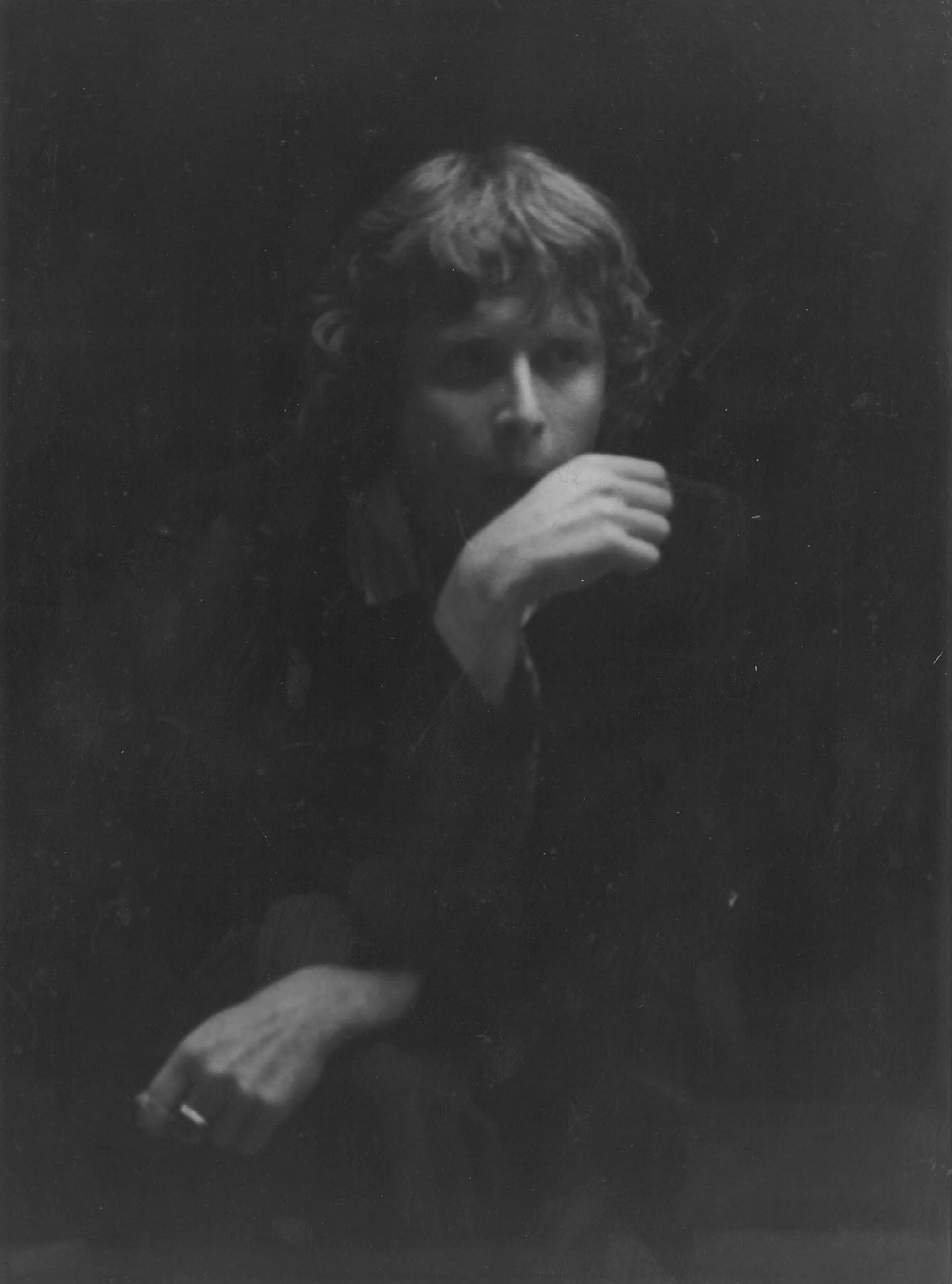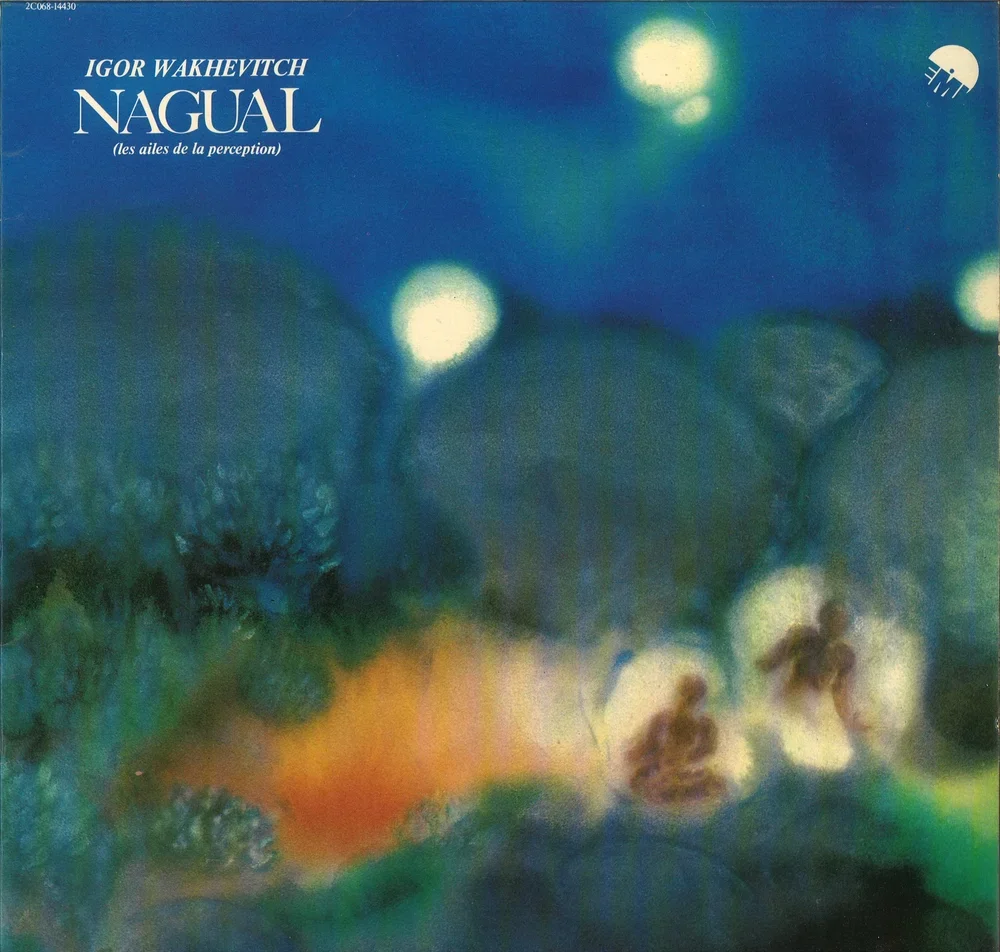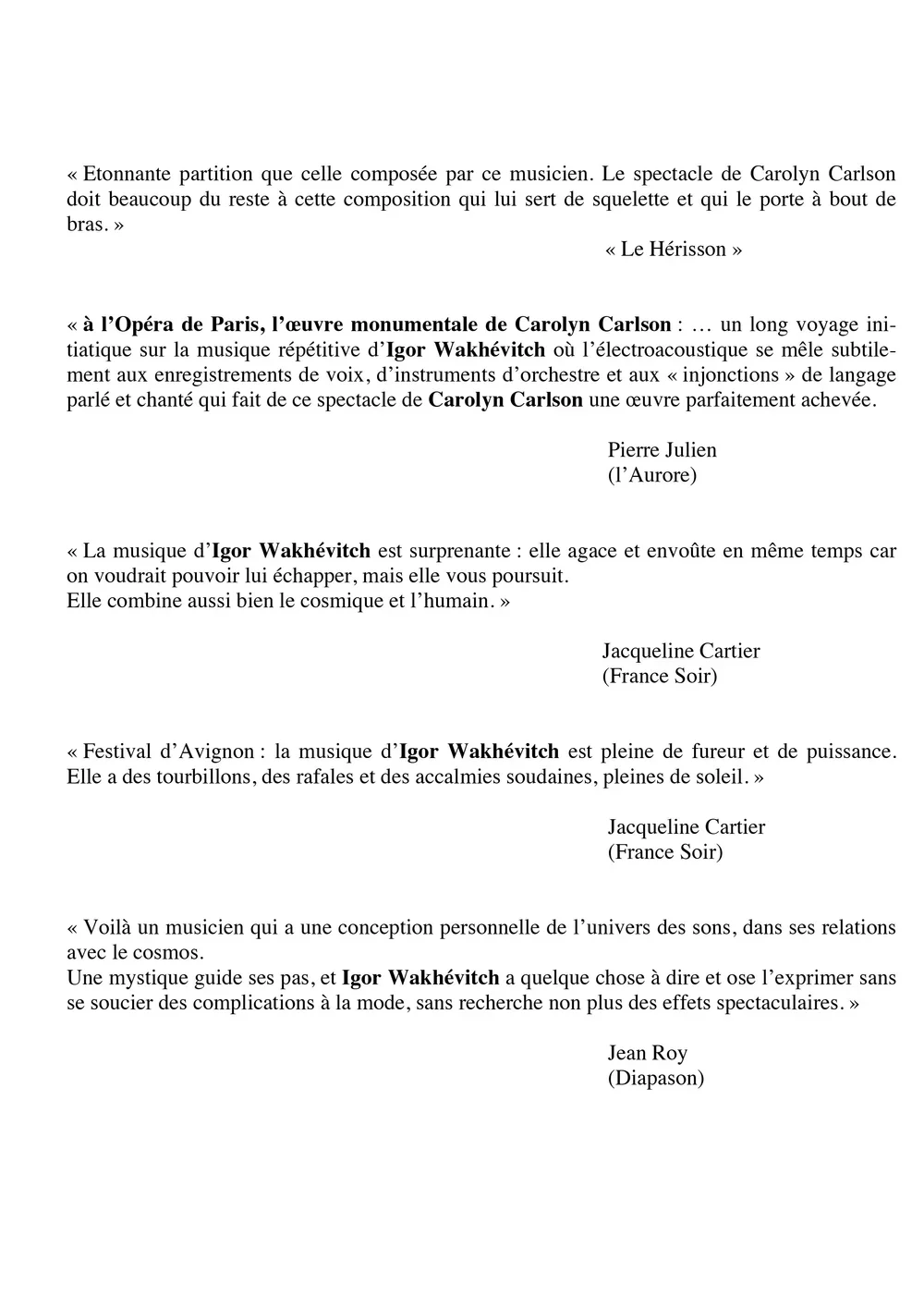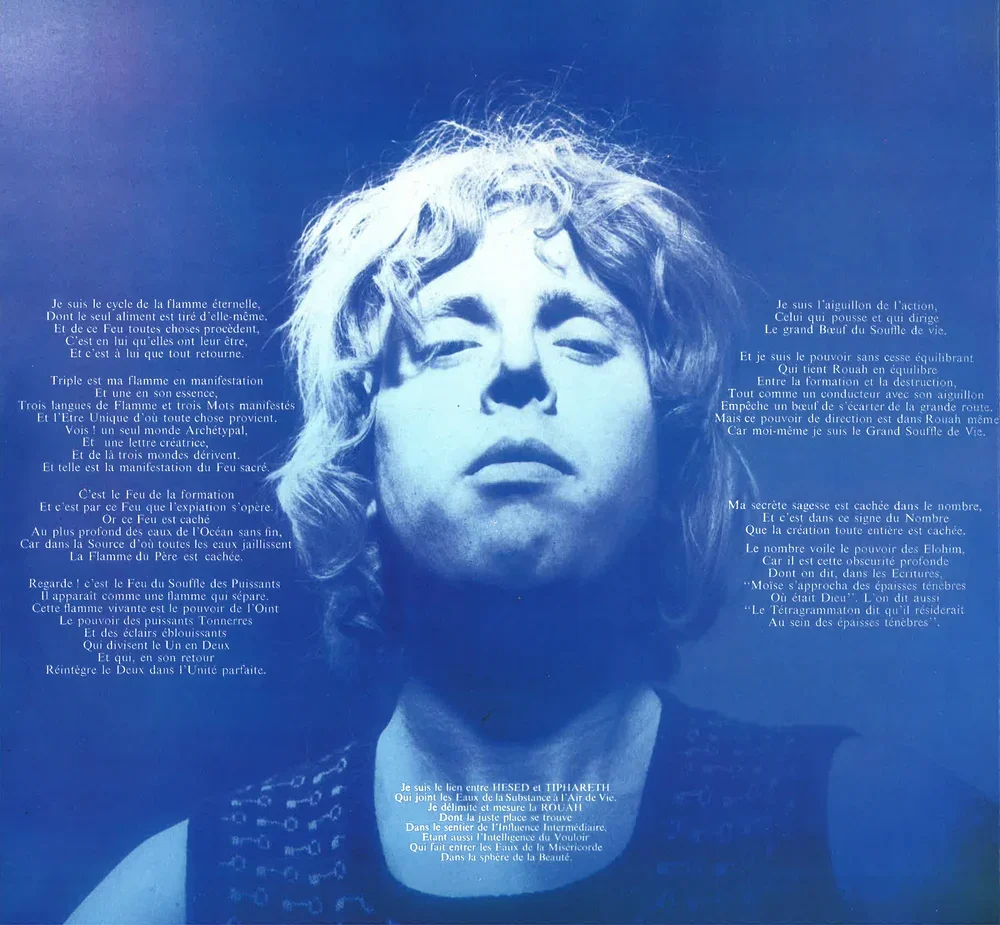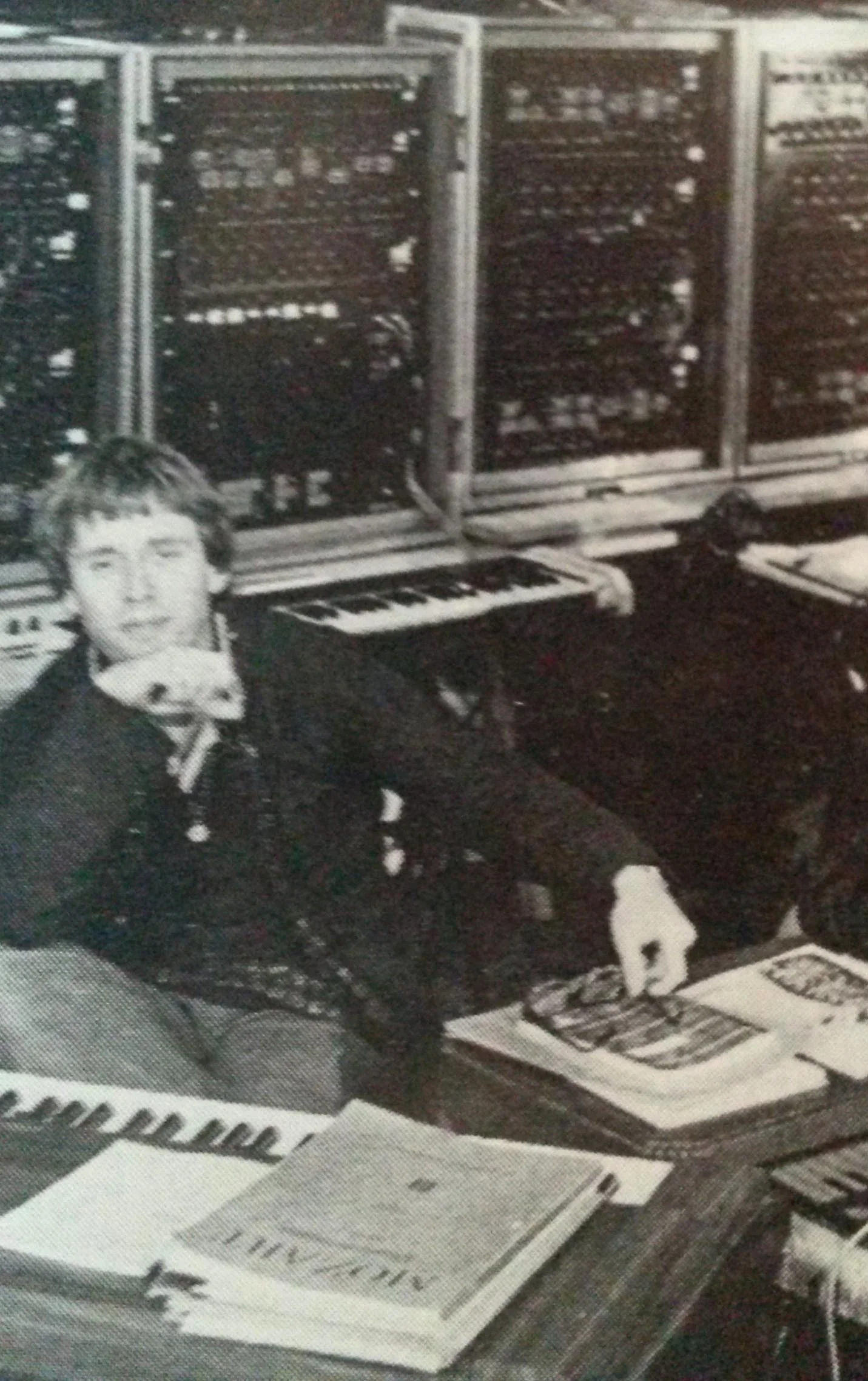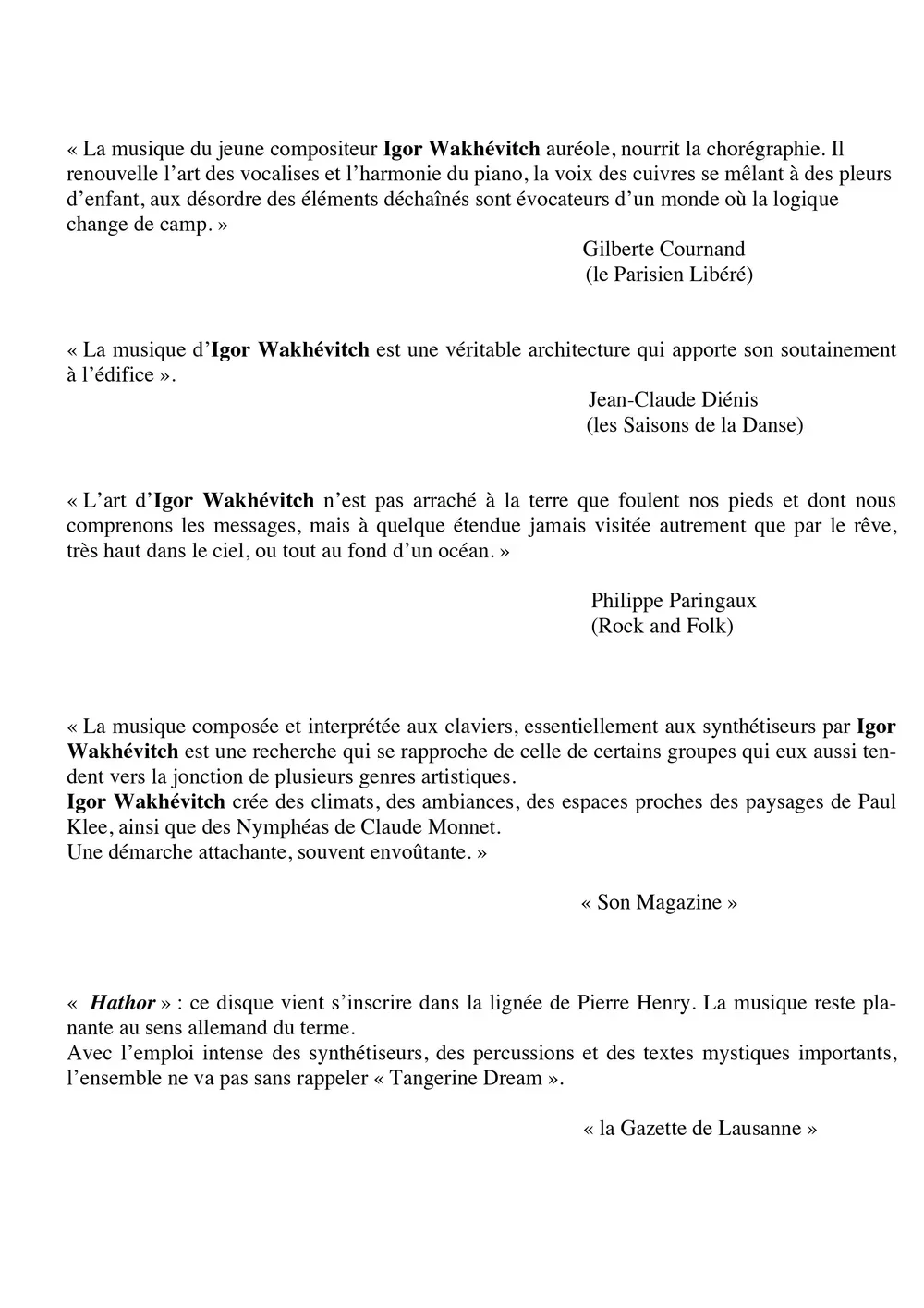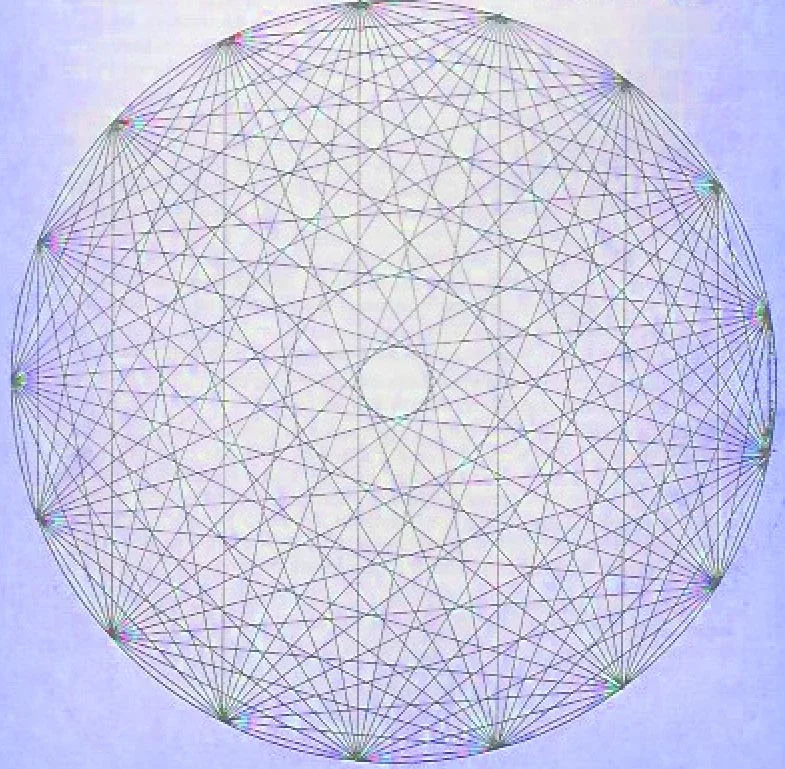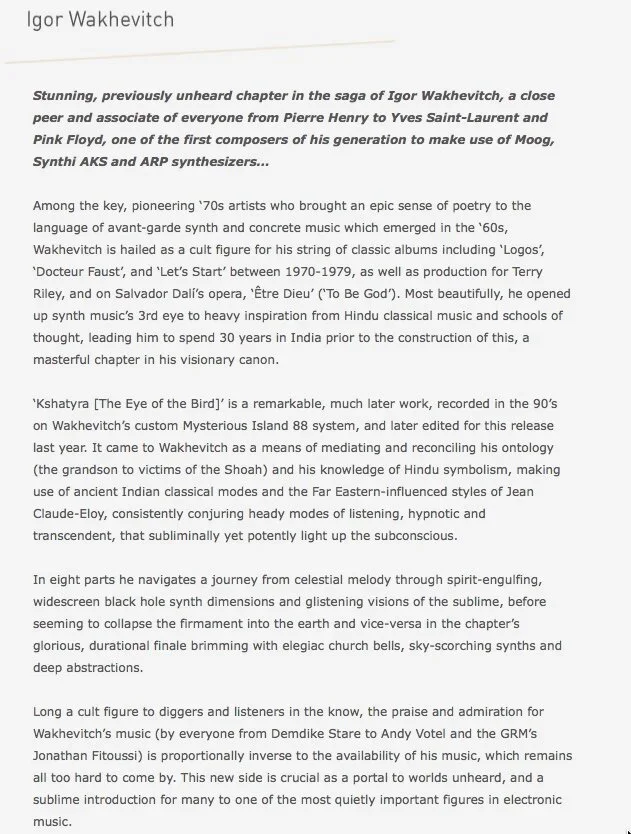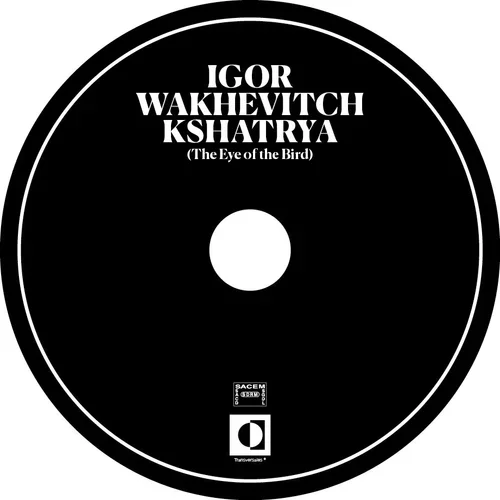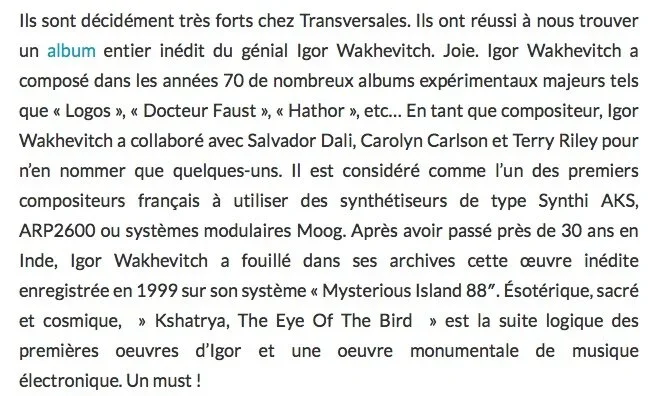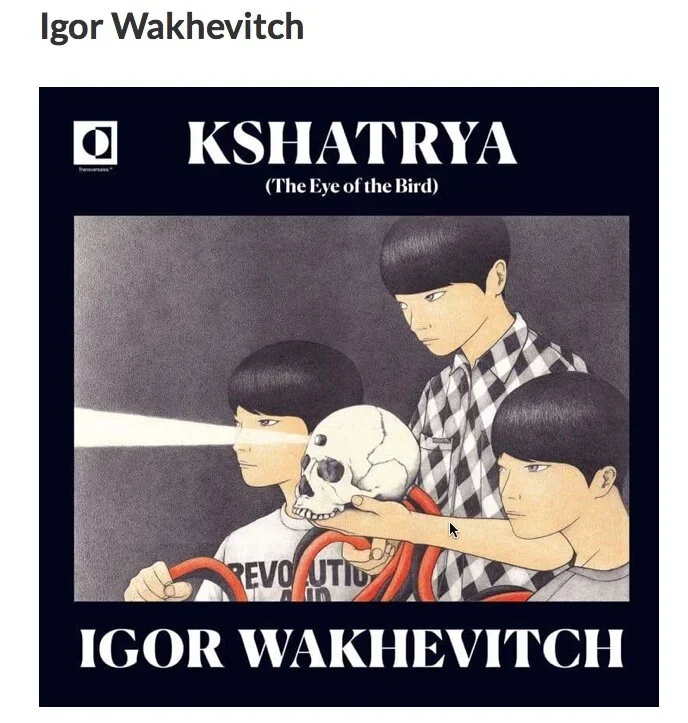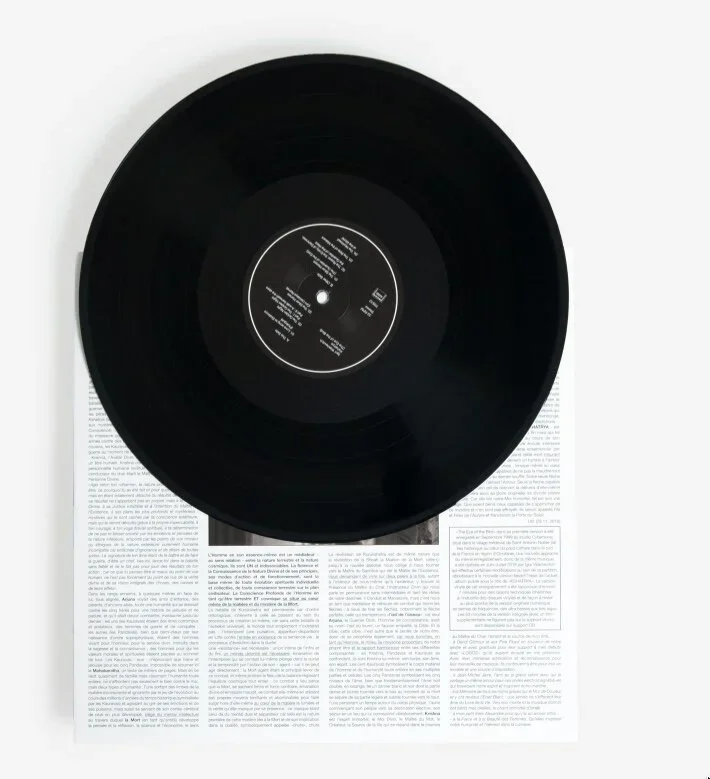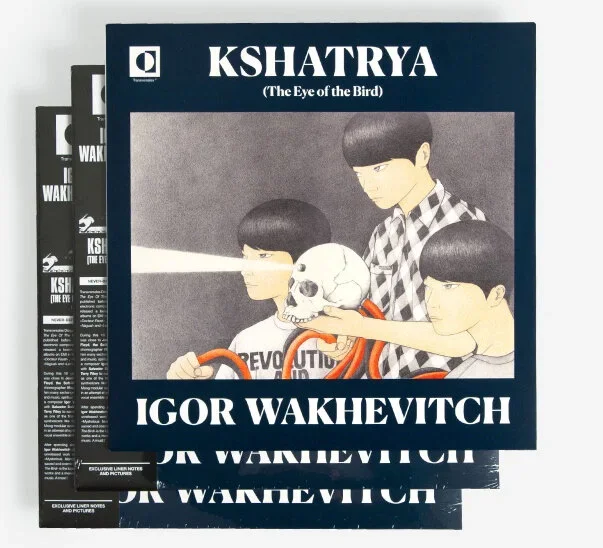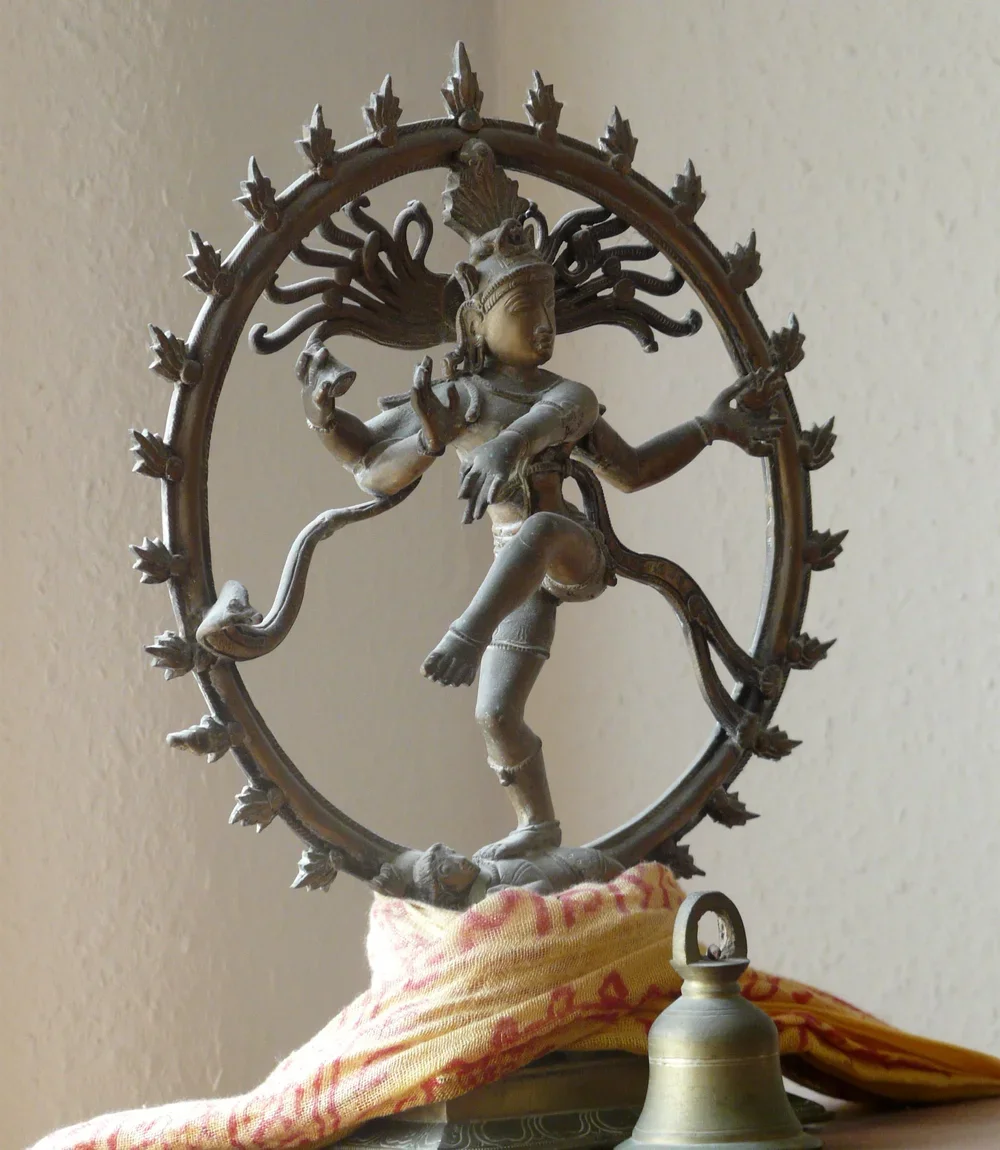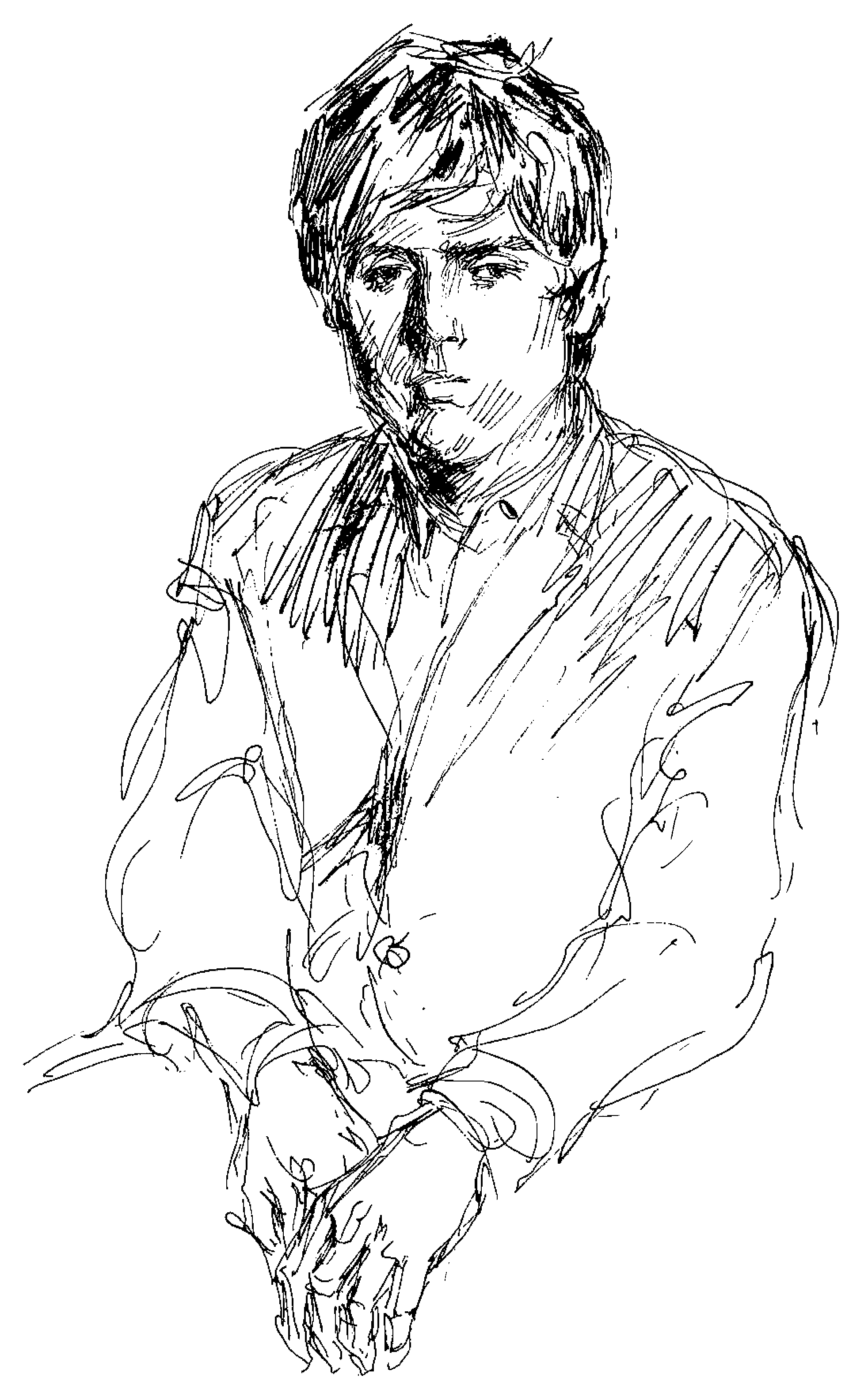Press Review – Igor Wakhevitch, Composer of Electronic & Contemporary Music
Over the decades, Igor Wakhevitch’s music has drawn the attention and admiration of the international press. This page gathers a selection of articles, reviews, and testimonials that shed light on his work: a singular path between electronic music, contemporary composition, and major collaborations (dance, stage, visual arts). A press review conceived as a timeless journey, beyond dates, close to listening.
Au fil des décennies, la musique d’Igor Wakhevitch a suscité l’attention et l’admiration de la presse internationale. Cette page réunit une sélection d’articles, de critiques et de témoignages qui éclairent son œuvre : un chemin singulier entre musique électronique, écriture contemporaine et collaborations majeures (danse, scène, arts visuels). Une revue de presse pensée comme un parcours intemporel, au-delà des dates, au plus près de l’écoute
French Press Highlights
“Let’s Start”: a totally successful, fully achieved album. Miles above the usual “electronic-planant” production!
— Philippe Adler (L’Express)
“The electronic music of Igor Wakhévitch is a more rigorous and complex construction than any of the works composed so far for Carolyn Carlson.
It creates an entire dreamlike theatre where music beats like an immense heartbeat.
The sounds that burst forth transport you from one world to another.”
— Pierre Lartigue (L’Humanité)
“Rina Schenfeld at the Théâtre de la Ville: her solo Threads is a true masterpiece of movement…
Igor Wakhévitch has woven around her echoes that extend tactile vibrations of her gestures and add a sense of poetic drift to a great moment of dance.”
— Marcelle Michel (Le Monde)
“One cannot speak of a performance by Carolyn Carlson without also thinking of Igor Wakhévitch for the music.”
— Anne Surger (Le Quotidien de Paris)
“Nagual” by Igor Wakhévitch.
This is music for keyboards and synthesizers, astonishing and mysterious, which lets the soul be infused as one exposes the body to the sun of summer.
Far from the deafening opiums, it conveys appeasement that is both joyful and life-affirming.
A music that does good.”
— Jacques Bonnadier (Le Provençal)
French Press Highlights
“An astonishing score composed by this musician. Carolyn Carlson’s show owes much to this composition which serves as its framework and which she carries in her arms.”
Le Hérisson
“At the Paris Opera, the monumental work of Carolyn Carlson: … a long initiatory journey on the repetitive music of Igor Wakhévitch where electroacoustics subtly mingle with voice recordings, orchestral instruments and Carlson’s spoken and sung ‘injunctions’, resulting in a perfectly accomplished work.”
Pierre Julien
L’Aurore
“The music of Igor Wakhévitch is astonishing: it seizes and envelops you at the same time. You would like to escape it, but it keeps pursuing you. It combines both the cosmic and the human.”
Jacqueline Cartier
France Soir
“Avignon Festival: the music of Igor Wakhévitch is full of fury and power. It has whirlwinds, gusts, and sudden bursts of applause, full of sunshine.”
Jacqueline Cartier
France Soir
“Here is a musician who has his own personal conception of the universe of sounds, of his relations with the cosmos.
A mystical approach that takes its time, and Igor Wakhévitch has something to say and to express without worrying about fashionable complications, without research for effect but with spectacular results.”
Jean Roy
Diapason
Composing “L’Orso e la Luna” commandited to Igor by Caroyn Carlons at the Teatro de la Fenice-Malbran Venice
French Press Highlights
Fishermanp’s Net = 153 fishes
Gilberte Cournand (Le Parisien Libéré)
“The music of the young composer Igor Wakhevitch, haloed with light, nourishes choreography. He renews the art of vocalizations and the harmony of the piano; the voice of brass blending with children’s cries, with disordered unleashed elements evocative of a world where logic shifts sides.”
Jean-Claude Diénis (Les Saisons de la Danse)
“The music of Igor Wakhevitch is a true architecture that provides its supporting framework to the edifice.”
Philippe Paringaux (Rock and Folk)
“The art of Igor Wakhevitch is not torn away from the earth trodden by our feet and whose messages we understand, but it extends into realms never before visited except by dream, very high into the sky, or all the way to the bottom of the ocean.”
Son Magazine
“The music composed and performed on keyboards, essentially on synthesizers by Igor Wakhevitch, is a research that approaches that of certain groups who also tended towards the junction of several artistic genres. Igor Wakhevitch creates climates, ambiances, and soundscapes close to the paintings of Paul Klee, as well as the Water Lilies of Claude Monet. An engaging approach, often spellbinding.”
Tribune de Genève
“‘Hathor’: this record falls within the lineage of Pierre Henry. The music remains powerful in the German sense of the word. With the intense use of synthesizers, percussion, and significant mystical texts, the whole inevitably recalls Tangerine Dream.”
They are decidedly very strong at Transversales. They managed to find for us a completely unreleased album by the brilliant Igor Wakhevitch. What a joy. In the 1970s, Igor Wakhevitch composed many major experimental albums such as Logos, Docteur Faust, Hathor, and more. As a composer, Igor Wakhevitch collaborated with Salvador Dalí, Carolyn Carlson, and Terry Riley, to name just a few. He is considered one of the first French composers to use synthesizers such as the Synthi AKS, ARP2600, or Moog modular systems.
After living more than 30 years in India, Igor Wakhevitch searched through his archives and found this previously unreleased work, recorded in 1999 on his mythical island studio: Mysterious Island 88.
Esoteric, sacred, and cosmic, Kshatrya, The Eye Of The Bird is the logical continuation of Igor’s early works and a monumental masterpiece of electronic music. A must!
Dance & Opera Collaborations - International Recognition
Gœthe Institute and Alliance Française in Mumbai India
features
“The Girl of Sixteen”
(one of the most sacred names of Lord Shiva)
Music by Igor Wakhevitch
Choregraphy by Olivier Patey (Opera de Paris, First Dancer)
Duo performed by Mademoiselle Elisabeth Platel, Prima Ballerina
Ballet of Paris National Opera and First dancer Olivier Patey
In the Honorable presence of Sri J.R.D. TATA
————————————————————————————————————————————————————————————————————————————
At the «Tata Theatre » : the grandeur of Igor Wakhevitch's composition of music : with great insight and strong creative impulse he has composed the abstract complexities of « The Girl of Sixteen». Wakhevitch combines the strenght of Classical Western and Indian music as well as electronic music to create works that are resonant with magic.
The music of Wakhevitch captures the
abstract qualities of the philosophy behind
« Dashavatara» (the Ten Incarnations of Vishnu). Wakhevitch deals with the growth of human mind, its working toward perfection. One really can enjoy his creativity. There are no pseudo flourishes of bringing Indianims into the score.
He does not delibarately force in classical Carnatic or North Indian elements into the composition and in spite of that the score is resonant with their moods and touches.
He is capable of recycling Indian music to flow and fit into Western mode.
Wakhevitch's music is so complex and abstract that perhaps the dancers were overwhelmed.
Sumitra Kumar-Srinivasan (Mumbai Magazine)
Mumbai
***************************************************************************************************************************************************************************************
« I feel more Indian than French » :
composer Igor Wakhevitch, whose ballet on the avatars of Vishnu was premiered in Mumbai at the prestigious « Tata Theatre » was inerviewed by the Sunday Observer Correspondant.
How did you come to live in India?: « When I published my first record for EMI in France I sent it to the Mother of the Sri Aurobindo Ashram. She wrote back sending Her Blessings and told me to come to India. One year later, I came.»
Did you not anticipate highly critical responses from people to whom you are presenting their own tradition ? : « Since I am living in India and feel to be an Indian myself (not by birth but by soul) I don't feel it so risky ; but only with taking risks can you progress. » etc.
World premiere of ballet on avatars, in presence of Sri J.R.D. TATA in person, in the audience :
« The music of Igor Wakhevitch, who has a definite place in the history of contemporary dance, was largely in the modern idiom, but being purposive, in that it was associated with the progression of the dance, even the electronic elements were expressive and evocative.
The music had a hauting ethereal quality with the judicious use of small bells. The ride and fall of the melody with the repetitive scrapings accompanying it had their expressions in the intertwining of limbs and forms of the earth bound dancers in the incarnation of Krishna.
Yet the music had an element of timelessness, tied up to the male dancer solo.The chant of voices introduced the incarnation of Kalki: a fitting finale to a ballet in which the analatycal and practical inventiveness of the European mind, joined hands with the prolific imagination and imagery of the Indian mind.
« Times of India», by our Music critic
INK WORK : IGOR WAKHEVITCH’s PORTRAIT BY RUSSIAN PAINTER SERGE IVANOFF





